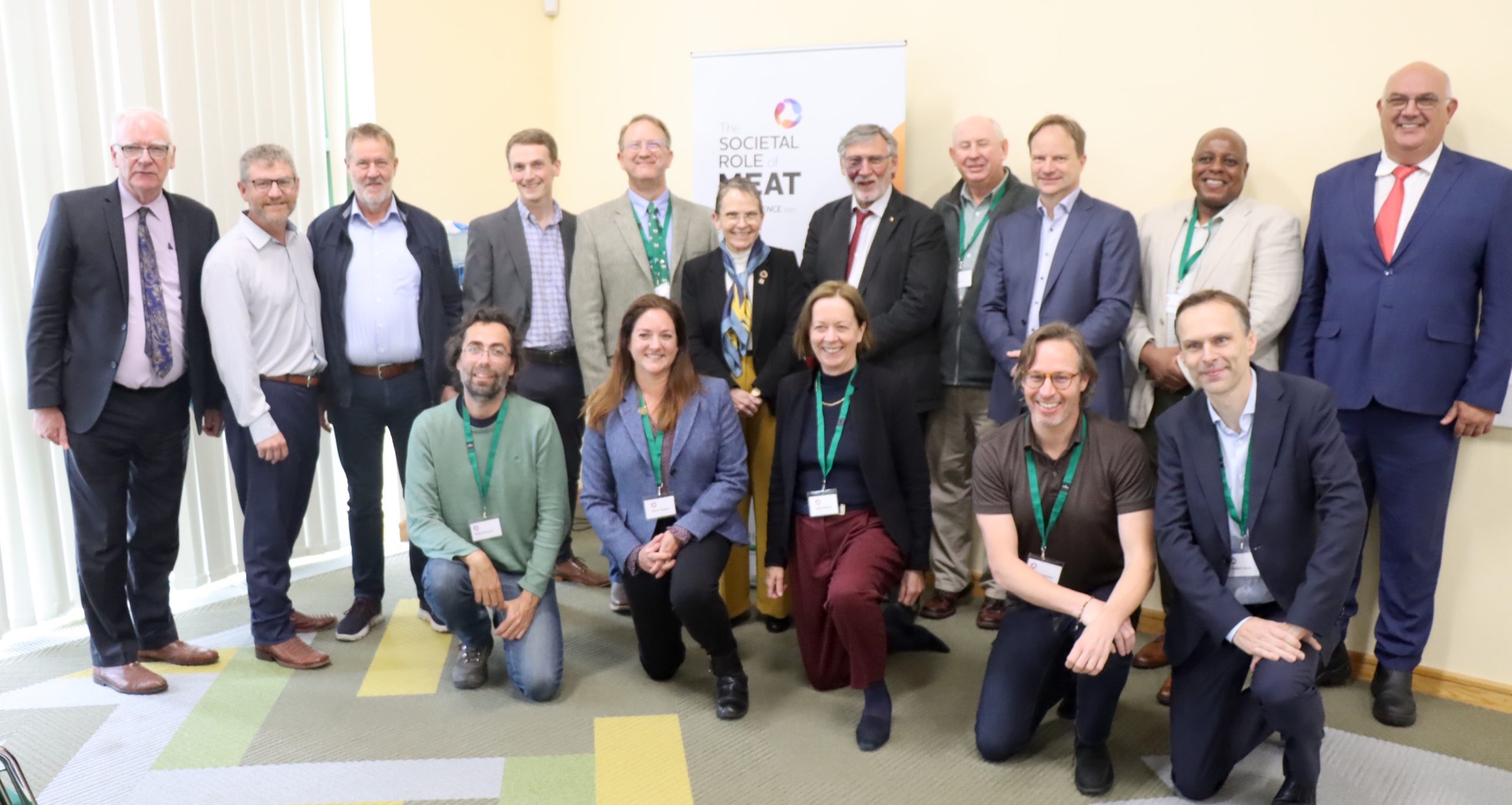
Presenters at the two-day summit on the societal role of meat in Dublin included Declan Troy, Jason Rowntree, Willhelm Windisch, Nick Smith, PeterBallerstedt, Shirley Tarawali, Paul Wood, Neil Mann, Peer Ederer, Max Makuvise, Theo de Jager, Pablo Manzano, Diana Rodgers, Alice Stanton, Bradley Johnson and Frederic Leroy.Picture: James Nason
SCIENTIFIC evidence confirming the role meat and livestock plays in well-functioning human diets and environmental landscapes is laid out in a special peer-reviewed edition of the scientific journal Animal Frontiers published today.
The journal, now available to view freely online, draws together a wide range of scientific papers and evidence presented at the October 2022 International Summit on the Societal Role of Meat in Dublin, covered by Beef Central (see links to earlier articles below).
The event led to the launch of the Dublin Declaration, a document which presents a balanced view of the science supporting animal agriculture and warns that livestock systems are too precious to society to become the victim of “simplification and reductionism”.
The declaration has now been signed by nearly 1000 signatories around the world.
Animal Frontiers is the third most-cited journal in agriculture, dairy, and animal science.
The journal edition’s guest editors and authors are among the nearly 1000 signatories of a declaration warning that livestock systems are too precious to society to become the victim of simplification and reductionism.
Declan Troy, Assistant Director of Research at Irish agricultural research body Teagasc which hosted last year’s summit, said livestock farming supplied food, nutrition, income and more, to hundreds of millions of people, and is of enduring cultural significance for many.
“Today’s publication shows that deploying scientifically-sound practices in animal agriculture is key to succeeding in the face of global health, climate, and development challenges,” he said.
Experts who participated in the October 2022 Summit called for the publication of the science presented to help inform public policies and recommendations related to meat production and consumption.
Dr Alice Stanton of the Royal College of Surgeons of Ireland commented: “The peer-reviewed evidence published today reaffirms that the most prominent global study which claimed that consumption of even tiny amounts of red meat harms health (the 2019 Global Burden of Disease Risk Factors Report) is fatally scientifically flawed and should be retracted.
In fact, removing fresh meat and dairy from diets would harm human health. Women, children, the elderly and those of low income would be particularly negatively impacted.”
Dr Adegbola Adesogan, Director of the University of Florida’s Global Food Systems Institute, noted: “Animal-source foods are superior to plant-source foods at simultaneously supplying several bioavailable micronutrients and high quality macronutrients that are critical for growth and cognitive development. Dietary recommendations to eliminate animal-source foods from diets ignore their importance, particularly the great need for these foods in diets of the undernourished in the Global South.”
Dr Wilhelm Windisch of Technical University Munich, Germany further noted: “Farmed and herded animals maintain a circular flow of materials in agriculture, by using and upcycling large amounts of material humans cannot eat, turning them into high-quality, nutrient-dense food. One-size-fits-all agendas, such as drastic reductions of livestock numbers, could incur environmental and nutritional consequences on a massive scale.”
The peer-reviewed edition of Animal Frontiers is available without charge at https://academic.oup.com/af/issue
Internationally recognised scientists confirm benefits of red meat and livestock production
The nine scientific research papers published todayconfirm the critical role red meat and livestock play in society, arguing that animal agriculture is key to the challenges around climate change and global food security.
Among the authors of the international papers are Australian scientists Dr Rod Polkinghorne, OAM, a leading innovator in the global red meat industry; Professor Neil Mann, a human nutrition expert with more than 30 years of clinical trial expertise; and Monash University’s Professor Paul Wood, AO, a leading expert on the future of cell-based proteins.
“Our papers published today are much more than just important pieces of scientific works to be discussed among industry advocates,” Dr Polkinghorne said.
“We want this major new analysis to inform public policy and education around meat production and consumption globally.”
Animal Frontiers is the official journal of four professional animal science societies including the American Society of Animal Science, the Canadian Society of Animal Science, the European Federation of Animal Science, and the American Meat Science Association.
“We are also calling for more scientists from all disciplines to engage with our industry so we can continue a healthy, balanced discussion on the future of animal agriculture globally – including nutritional health, the environment, the ethical consumption of meat, and global food security.”
The papers published today in Animal Frontiers formed the basis for discussion at a Dublin-based event held last year, the International Summit on the Societal Role of Meat, and for a Sydney-based event in March, The Good Meat Summit, hosted by AMPC and MLA.
Dr Polkinghorne said the Animal Frontiers papers also addressed the anti-meat rhetoric evident in some developed countries, including Australia.
“Our work will go a long way to communicating the importance of animal agriculture for our society, including red meat and livestock production here and around the world,” he said.
Earlier articles:
Scientists called on to sign ‘Dublin Declaration’ supporting balanced view on meat
The essential role of meat and dairy in healthy diets
Modern humans have evolved on a diet high in animal foods for four million years
Why cows are the Lionel Messi of global food security
Australian scientists join hundreds globally in support of meat and livestock production
Why nutrition must be at centre of sustainable food policy
Historic herbivore herds on par with today
Research shows similar emissions between wild herbivores and cattle
The ethical arguments in favour of meat consumption
Alternative proteins hit ‘trough of disillusionment’
International scientists gather in Dublin to clear the air on meat and dairy science


Congratulations to all those involved in this critical initiative . The key now will be to disseminate the information effectively. Every university needs to be involved in technology transfer including those young up and coming scientists at the coalface. Such institutions seem to have ignored their responsibility to the public as crucial to decentralization and development. Here’s a chance to re-connect, particularly to rural and regional areas. Sincerely Richard B. Wright
Good to see scientific evidence and common sense starting to respond to the pressures of the ill informed. I would like to see the addition of research into the benefits of graizing animals on soils where the carbon capture is increased by the action of the grazing animal. Dr Susan Orgill presents this research in layman’s terms
Wonderful to read credible peer reviewed scientific research is helping to dispel some of the crazy claims made by animal activists.
Livestock producers have been maligned with accusations of being environmental vandals.
Commonsense tells you that ruminant animals grazing free range conditions turning low protein grass into high protein meat is one of the most remarkable things on earth.
We must be vigilant and get this information into the mainstream public before we are legislated out of existence.
Remember, “ No great idea started with a Salad”.
I tried the link to the Animal Frontiers (special edition), but ended with a “Page not found” response; could someone please check the link. Thank you, Bob Shepherd DAF Charters Towers
Thanks for pointing that out Bob, link in article now fixed – also can be accessed here. Editor